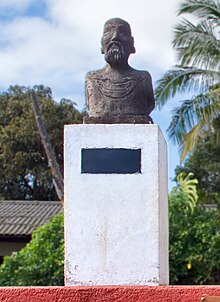Atamu Tekena
| Atamu Tekena | |||||
|---|---|---|---|---|---|

Bust of Atamu Tekena, located at a central plaza at the island capital of Hanga Roa
|
|||||
| King of Rapa Nui | |||||
| Reign | 1883–1892 | ||||
| Predecessor | Council of State | ||||
| Successor | Riro Kāinga | ||||
| Born | c. 1850 | ||||
| Died | August 1892 | ||||
| Spouse | Ana Eva Hei | ||||
|
|||||
| Religion | Roman Catholicism | ||||
| Full name | |
|---|---|
| Atamu Maurata Te Kena ʻAo Tahi |
Atamu Tekena or Atamu te Kena, full name Atamu Maurata Te Kena ʻAo Tahi (c. 1850 – August 1892) was the penultimate ‘Ariki or King of Rapa Nui (i.e. Easter Island) from 1883 until his death. He was not a royal of the traditional line and was appointed by the French Picpus missionaries in the island. In 1888, he signed a treaty of annexation ceding Easter Island to Chile. His name is translated as "Adam the Gannet".
He was born around 1850 as an extended member of the Miru clan, traditionally associated with the native kingship (ariki mau). Due to Peruvian slave raiding and the decimation of the native Rapa Nui population by introduced diseases, the population of Easter Island had dropped to 110 individuals by 1877. In 1864, the French Picpus missionaries established themselves on the island and converted many of the Rapa Nui people to Christianity. The last recognized ‘ariki mau Kerekorio Manu Rangi died in a tuberculosis epidemic in 1867.
After this social upheaval, a Council of State was established under the leadership of French adventurer and sheep rancher Jean-Baptiste Dutrou-Bornier who asserted more and more control and expelled the Catholic missionaries. He installed his wife as the unrecognized "Queen" of the island and unsuccessfully petitioned France for protectorate status.
Dutrou-Bornier was assassinated in 1876 and the Roman Catholic mission returned. His business interest was inherited by the Anglo-Jewish-Tahitian Prince Alexander Ariipaea Salmon who managed a sheep ranch which constituted much of the land on the island. Salmon ruled in all but name. The reestablished mission set up a new native government based on the indigenous district councils of Tahiti. At the instigation of Bishop Tepano Jaussen of Tahiti, Atamu was appointed by Father Hippolyte Roussel as King in 1883 to represent their interest alongside two to‘opae (councillors) and two judges. He adopted the additional name Maurata after the ariki mau who died during the Peruvian slave raids. Unlike his predecessors, Atamu was not considered a member of the traditional royal patrilineal line and held little political power.
...
Wikipedia
